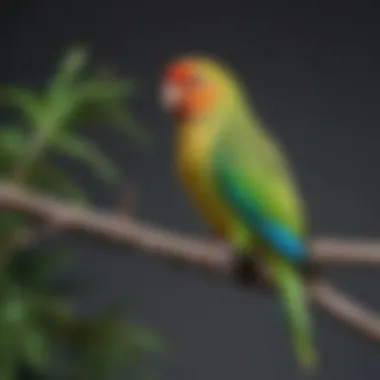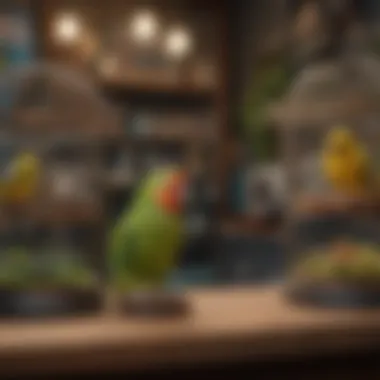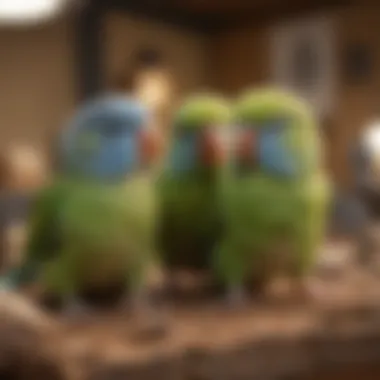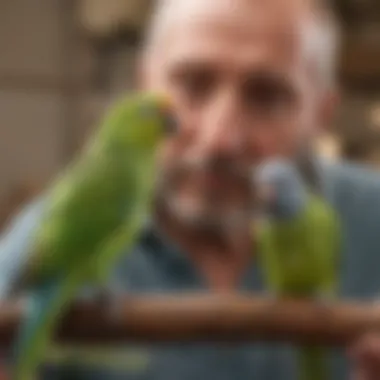Where to Buy Parakeets: Your Ultimate Guide


Intro
Purchasing a parakeet is more than just acquiring a pet; it is a commitment to the well-being of a living being. The avenue one chooses for obtaining a parakeet can greatly influence the animal's health, behavior, and overall happiness. Contemplating where to buy parakeets involves understanding the ethical implications behind sourcing these birds. This guide aims to enlighten potential owners about the various options available, ensuring they are adequately informed when making this significant decision.
Care Tips
The foundation of a prosperous relationship with a parakeet lies in understanding its needs. Proper care helps ensure your bird lives a healthy and fulfilling life. Here is what every parakeet owner should know concerning daily care routines, cage setup, hygiene, and seasonal adjustments.
Daily Care Routines
A parakeet requires consistent attention each day. This commitment includes not only feeding but also engaging with the bird to nurture its social nature. Daily care tasks can be grouped as follows:
- Refresh water supply
- Provide fresh food daily
- Clean food and water dishes
- Engage in play and interaction
Cage Setup and Maintenance
An optimal living environment is vital for the comfort of a parakeet. Select a cage that allows enough room for flight and movement, ideally, a spacious design. Regular maintenance should feature:
- Checking cage structure for safety
- Replacing soiled bedding
- Securing perches and toys to prevent injury
Hygiene and Cleaning Practices
Cleaning routines help prevent diseases in birds. Allocate time to thoroughly clean the cage at least once a week. Ideal practices include:
- Wiping surfaces with safe cleaning solutions
- Disinfecting toys on a routine basis
Seasonal Care Adjustments
Parakeets, much like other pets, may react to environmental changes. During seasons such as winter, watching out for temperature fluctuations is vital. Heat lamps or adjusting cage placement might be necessary to ensure a comfortable habitat.
Behavioral Insights
Understanding behavioral cues is crucial for fostering a strong bond. Recognizing bird body language will help predict mood and well-being. Signs to note include:
- Feather fluffing indicates relaxation
- Cling to cage bars may signal boredom
Common behavioral issues can arise, often due to lack of stimulation or social interactions. Techniques focusing on positive reinforcement can also cultivate desired behaviors.
Social Interaction Needs
Parakeets are inherently social creatures. They thrive in environments where they can interact—either with their owners or other birds. Ensure your feathered friend is not subjected to long periods of isolation; otherwise, stress or depression may develop.
Nutrition Guides
A balanced diet directly ties into the long-term health of a parakeet. Here are must-know essentials:
Essential Diet Components
Seeds are not sufficient on their own. Fresh fruits and vegetables provide vital nutrients. Legumes and high-quality pellets should also be included. This combination ensures a complete diet.
Safe and Toxic Foods
It's crucial to know which foods enrich versus harm your bird. Avoid common toxic items such as chocolate, avocado, or caffeine. Opt for:
- Broccoli
- Carrots
- Apples (seeds removed)
Balanced nutrition directly impacts health.
Wellness and Health
Routine health check-ups with an avian veterinarian should be part of every parakeet owner’s considerations. Identifying symptoms—or any behavior anomaly—can lead to faster diagnosis and intervention for common diseases. For instance:


- Reduced appetite may indicate health issues
- Feather plucking could signify stress
Furthermore, preventative care measures help reduce future afflictions.
Enriching Activities
Maintaining engagement is essential to promote a fulfilled life for your parakeet. Toys and activities can offer excellent stimulation avenues. Consider:
- Chewable, colorful toys
- Interactive foraging activities
Offering variety and creativity in stimulation encourages joy and buoyancy in life for your feathered friend. Workshops or resources available can provide additional insights.
Remember: Responsible pet ownership hinges on creating an enriching and informed environment for your parakeet. Always prioritize their different needs before deciding where to buy one.
Prelims to Parakeets
Introducing parakeets into one’s home is a decision that inspires joy and responsibility. This small bird species, known for its sociable and playful nature, captures the attention of pet lovers. Understanding more about parakeets is key for any potential owner. This section will delve into their characteristics, typical behaviors, and why they make suitable pets.
Parakeets, or budgerigars, are prized for their vivid colors and captivating personas that enhance human companionship. With their vocal skills and ability to mimic, they provide endless entertainment. Keeping a parakeet encourages bonding and interaction, which improves overall well-being for both bird and owner.
Yet, selecting a parakeet warrants considerations about their care needs and social requirements. These birds thrive in interactive environments and benefit greatly from being around humans as well as other birds. Prospective owners must assess whether they can dedicate time to engage with their feathered friends daily.
Understanding and ensuring proper care from the outset is vital for a parakeet's health and happiness.
Initial research helps in choosing a specific variety that fits individual lifestyles. Next, potential owners must recognize that housing and diet play crucial roles in their development. Committing to ownership of a parakeet is indeed a long-term investment, demanding responsible stewardship.
Summarizing, this section serves as the groundwork for the subsequent discussions in the guide, aiming to foster informed, ethical decisions for all who desire to invite a parakeet into their lives. Ultimately, it presents a glimpse towards the joy yet responsibilities that accompany this delightful species.
Understanding Parakeet Types
Understanding the various types of parakeets is essential for prospective bird owners. Each species comes with unique traits and characteristics, which play a significant roleinhardware it's overall care and compatibility with your lifestyle. Familiarity with the different types will guide you in making informed decisions about the parakeet that best suits your home and preferences.
Common Varieties of Parakeets
There are several varieties of parakeets, with the Budgerigar,commonly known as the Budgie, being the most recognized and popular amongst pet owners. These small, sociable birds are available in a variety of colors, making them visually appealing and enjoyable companions.
Other notable parakeet types incude:
- English Budgerigar: Larger and often considered calmer.
- American Budgerigar: Smaller in size, they are quite energettic.
- Indian Ring-necked Parakeet: Recognized for their long tail and striking colors.
- Neblina Parakeet: Lesser-known, these birds are unique in appearance and suitable for experienced keepers.
Each variety has its own charm and potential compatibly with owners based on their temperaments. Understanding these differences can dictate important aspects, such as socialization efforts, activity levels, and even the type of cage or habitat needed.
Differences in Care Requirements
Care requirements can vary greatly between the types of parakeets. While all benefit from a varied diet of seeds, fruits, and vegetables, some species might need more specialized nutrition based on health challenges associated with them. For example,
- Budgerigars generally do well on a basic diet but can develop obesity if overfed, reporting a need for exercise.
- Indian Ring-necked Parakeets, being slightly larger, will require a larger cage and different toys due to their higher energy levels.
Additionally, the presence of behavioral and health issues specific to certain varieties necessitates considerations in their housing and socialization practices. A comprehensive assessment is neccessary in selecting suppleis that aligns best with each type’s requirements, facilitating a favorable environment for your bird.
Understanding different parakeet types not only aids in making a selection but also enhances the overall experience of bird ownership, ensuring appropriate care and a fulfilling companionship.
This detailed awareness positively contributes to the parakeet's well-being and has lasting implications for anyone considering bringing a parakeet into their homes.
Buying from Pet Stores
Buying parakeets from pet stores is a prevalent method for many potential bird owners. It offers convenience and the opportunity for immediate companionship. Pet stores often have a diverse range of bird species and usually, provide necessary supplies and support. However, care is needed to ensure the purchase aligns with ethical sourcing and the best outcomes for the animal's health.
Evaluating Store Credibility
Before acquiring a parakeet from a pet store, assessing the store's credibility is vital. A reputable establishment will prioritize the animals' well-being, providing proper care and facilities. Here are some points to consider:
- Look for licenses and certifications: A credible store should display appropriate licenses and health certifications.
- Observe the condition of the store: Cleanliness, organization, and the overall condition of the animals' habitat are good indicators of quality care.
- Employee knowledge: Staff should be able to provide informative insights into bird care, dietary requirements, and behavioral outputs. Knowledgeable employees can help guide you to make an informed decision.


By entering a trustworthy pet store, prospective owners can feel more confident about their choice of parakeet.
Assessing Bird Health in Stores
Assessing the health of parakeets available in stores is essential for ensuring your new pet is healthy. Specific signs can alert you to potential health issues:
- Physical appearance: Look for signs of unkempt feathers, unusual posture, or drooping tails. Healthy birds generally have vibrant plumage and active behavior.
- Behavioral Observation: Active and alert birds are healthy. If a bird appears lethargic or seems to have difficulty perching, you may want to reconsider.
- Inquire about the health history: Ask store personnel about the bird's background, including vaccination records and previous illnesses. Understanding the bird's health history can provide useful context for its expected health foster relevance information for care post-purchase.
In healthy conditions, a parakeet will show curiosity and socialize with you. It is crucial to ensure these characteristics are present before making a purchase.
Engaging with both pet store credibility and bird health not only enhances the purchaser's experience but can significantly impact the wellness of the new feathered companion.
Purchasing from Breeders
Purchasing from breeders is a significant element when seeking parakeets. Breeders often provide a wide range of bird types, ensuring that potential owners have varied choices. When entering this partnership, one benefits from acquiring healthy birds raised under proper conditions. These birds are more likely to be socialized, which is essential for adjusting well to a new home.
Opting for breeders also allows future bird owners to gain insights into the lineage and care needs of their pets. In many cases, breeders offer ongoing support, sharing experiences that can enhance the caretaking process. It is crucial to recognize the trust that goes both ways in this transaction because breeders emphasize a commitment to the well-being of the birds.
Locating Reputable Breeders
Finding a reputable breeder requires a careful and thorough approach. Consider starting with established networks such as the American Budgerigar Society or other local bird clubs. These organizations can be a gateway to discovering breeders with a solid reputation.
- Verify Credentials: Look for breeders who are registered with avian specialty clubs or organizations. This is a strong indication of their professionalism in bird care.
- Visit in Person: If possible, visiting breeder facilities provides insight into how the birds are raised. Notice the cleanliness of the environment, space available for birds, and overall health.
- Online Research: Use web forums or social media groups on platforms like Reddit or Facebook to gather recommendations or reviews about local breeders.
Questions to Ask Breeders
Asking appropriate questions is vital when approaching breeders. These inquiries ensure that the breeding practices are ethical, promoting health and socialization. Here are a few suggested questions:
- What is the age of the parakeets for sale? Evaluating the right age is crucial for training and bonding.
- Can you share health records? Examining vaccinations or any medical treatments enriches understanding.
- How are the birds socialized? Insight into this helps ensure the bird is trustworthy and friendly.
- Do you offer any guarantees or return policies? This adds a level of security to the purchase.
- What do you recommend for their ongoing care? Recommendations directly from breeders can be invaluable for new owners.
In the end, a responsible breeder not only stands behind their birds but also understands the needs of pet parents.
Establishing a strong connection with a reputable breeder contributes significantly to a positive bird-keeping experience. Knowledge gained through appropriate dialogue affects both the present circumstances and the future adjustments of parakeet ownership.
Rescue Organizations and Shelters
When considering where to buy parakeets, rescue organizations and shelters play a vital role. These institutions focus on rehoming birds in need, often providing a safe haven for parakeets that require care after being abandoned, surrendered, or rescued from harmful situations. Emphasizing adoption instead of commercial sales, these organizations work to mitigate the ongoing issue of bird overpopulation.
It is essential to underscore that adopting a parakeet not only transforms the life of the individual bird but also contributes to the broader goal of protecting avian populations. Many of these shelters work tirelessly to educate potential owners on responsible pet ownership and the specific needs of parakeets. By choosing to adopt, one can provide a loving home to a bird that may otherwise face negative outcomes in a shelter environment.
Benefits of Adopting from Rescues
There are numerous advantages to opting for a parakeet from a rescue organization rather than traditional means. First and foremost is the moral satisfaction of saving a life. Many birds in rescues have a challenging past. Offering them a new home can significantly improve their quality of life.
Additionally, adopting from a rescue often comes with the support of knowledgeable staff. These professionals are usually passionate about birds and can share valuable insights regarding care, behavior, and training. Here are some benefits of this approach:
- Cost-Efficiency: Adoption fees are generally lower compared to purchasing from a breeder or pet store. Many rescues also include initial health checks and vaccinations in their fees.
- Screening and Health Check: Rescued birds often undergo screening for common illnesses. This initial health assessment helps ensure that your new parakeet is healthy before it joins your home.
- Support and Resources: Most shelters offer ongoing support to adopters. They commonly have training resources, socialization tips, and advice for integrating your new bird into your home environment.
- Ethical Practices: Choosing to adopt promotes ethical treatment of animals. It empowers the movement toward relocation instead of breeding new parrots, reducing the strain on wild populations.
Online Platforms for Purchase
Purchasing parakeets online has become an increasingly popular option for potential bird owners. This approach offers various advantages, including convenience and access to a wider selection. Online platforms allow buyers to explore multiple sellers from different regions, enhancing the chances of finding the specific breed or type of parakeet desired. However, navigating these virtual marketplaces comes with its own set of challenges and considerations.
Evaluating Online Sellers
When using online platforms to purchase parakeets, one of the most critical steps is evaluating the credibility of the sellers.
- Research Seller Reputation: Start with a basic search on the seller’s name and website. Look for reviews on platforms like Reddit or Facebook groups dedicated to bird ownership. Positive feedback from previous buyers can signal reliability.
- Contact Information: A trustworthy seller should have clear contact information. If seller only provides a form without phone or email details, it can be a red flag.
- Transparency: Ethical sellers often provide transparent information about the breeding and health history of their birds. Request proof of health clearances and documentation about parental lineage, if available.
- Policies: Review the seller’s return and refund policies. Understand what options you have if the bird does not arrive in good health.
Purchasing a bird online can be less personal than buying in person. Hence, these steps are essential to ensure you make a safe choice.
Shipping Considerations for Birds
When buying parakeets online, shipping is a critical factor. The well-being of the bird during transport must be considered.


- Packaging Standards: Reputable sellers should follow recognized packaging standards. Birds must have adequate space and ventilation during shipping. The container should also be safe and secure.
- Temperature and Time Constraints: Birds are sensitive to temperature changes. Sellers may use temperature-controlled environments to maintain optimal conditions. Additionally, minimize shipping time whenever possible to reduce stress on the bird.
- Health Check: If sellers provide a health check prior to shipping, ensure the attendance of a vet. Confirm that the bird is stress-free and ready for transport.
Remember that the health and happiness of your future parakeet depend significantly on these considerations during shipping.
Ethical Considerations in Bird Acquisition
The acquisition of birds, including parakeets, requires more than just finding a supplier. Ethical considerations must be a top priority for any potential owner. Choosing an ethical source impacts not just personal practices but also entire ecosystems and breeding practices globally. Adopting or buying from responsible sellers signifies a commitment to animal welfare and environmental integrity.
Understanding these considerations helps potential bird owners make more informed decisions and supports the idea of responsible pet ownership. A showcase of ethical behavior can inspire positive actions across communities and can even influence how pet ownership and breeding are perceived in society.
Minimizing Impact on Wild Populations
The demand for parakeets has made them popular, but this popularity can have detrimental effects on their natural habitats. Wild populations face threats from overharvesting and habitat loss often encouraged by the illegal pet trade. When acquiring a parakeet, it’s essential to consider how your choice affects not only one bird's life but the overall health of wild populations.
To help with this, owners can consider the following elements:
- Research Legislation: Know your local laws and regulations; purchasing birds from illegal sources harms both animals and ecosystems.
- Choose Captive-bred Birds: Buy from breeders where birds are raised in controlled environments, ensuring wild populations remain undisturbed.
- Educate Others: Share knowledge about sustainable practices and encourage friends or family to follow suit.
Engaging in practices that protect wild parakeets contributes to healthier ecosystems, ultimately benefiting the birds you want to care for at home.
Importance of Responsible Breeding
Another significant aspect of ethical acquisition relates to the sources from which parakeets are bought. Deliberate responsible breeding refers not merely to breeding for profit but entails a sincere commitment to the health and well-being of birds. Prioritizing wellbeing over sales on the part of breeders helps alleviate many issues either found in pet birds.
The advantages to pursuing ethical breeding are clear:
- Genetic Diversity: Responsible breeders maintain proper genetic lines, which is crucial for the future health of parakeets. Inbreeding leads to health issues, which ultimately means more costs for future owners.
- Health Checks: Ethical breeders perform rigorous health screenings, which are essential. They often ensure that the birds they sell are free from diseases and have received the required vaccinations.
- Support Resources: Many ethical breeders follow-up after the sale, providing a support network for new owners that aids in bird care practices.
It fosters a sense of community where parakeets and potential owner get the care closer to natural habitat, enhancing the chances of happy companions in homes across the nation.
Preparing for Your New Parakeet
Bringing a parakeet home is an exciting journey. It involves more than simply purchasing a bird. To ensure a smooth transition for both the owner and the parakeet, advance preparation must be prioritized. Preparing effectively for a new parakeet sets a solid foundation for a tranquil relationship and a healthy living situation.
One of the more critical aspects of preparation involves ensuring that you possess all necessary supplies. Creating a welcoming space is also imperative, as it facilitates a secure environment for the parakeet to thrive. Let's cover these key considerations in depth.
Essential Supplies Before Purchase
Acquiring essential supplies prior to bringing your parakeet home leads to fewer challenges, making the initial days easier. Owning a parakeet is a commitment requiring suitable resources to accommodate its needs.
Must-Have Supplies Include:
- Cage: Buy an adequately sized cage to allow for movement and flight. Ensure the bars are safe and not too far apart to prevent escapes.
- Food and Water Dishes: Durable and easily cleaned bowls are essential for daily feeding and hydration.
- Quality Food: A balanced diet including seeds, pellets, fresh fruits, and vegetables should be ready for optimal health.
- Perches and Toys: Various perches provide different types textural support for paws; toys engage them mentally and cultivate their skills.
- Cage Cover: This aids in creating a dark environment conducive for type of restful sleeping.
- First Aid Supplies: Basic items for bird health like a first aid kit are important in case of minor injuries of feeding intolerance.
Readily putting your little companions’ necessities before trimmings is defined critical step in animal ownership.
Creating a Welcoming Environment
Establishing a welcoming environmen fosters a spirit of exploration within your new feathered friend. The new atmosphere will help the parakeet adapt quickly, increasing comfort and security. There are vital factors noticeable to achieve this.
- Location of the Cage: Place the cage in an area of the home where it can observe family activities but is not subject to extreme temperatures, drafts, and loud noises.
- Decor and Accessories: Add items like greenery or safe natural branches. Limit the clutter close by, and facilitate ample free space by avoiding crowded countertops.
- Choosing Proper Lighting: Ensure the room in which the cage is accented by natural light, benefician for bird wellness and behavior. Attraction molding from stable nights can be effective literally for breedeers to mingle closeagain.
- Routine Interactions: Establish vibrations early, visit frequently to foster bond, and generate comfortable tone, spend time having social sessions. Changing perception within limits fosters house-status without push away outdoors sensations activities.
A well-prepared environment helps your/intended bird feel that it is home for them therefore minimizing initial fright tagging along step after physical establishment.
**“Preparation is an investment in ensuring the well-being of your new parakeet. Consistently amusing jubilant quiet homes may yield cut-context approaches.
Culmination
In summary, the topic of acquiring parakeets demands thoughtful consideration and responsible approaches. This article outlines the diverse pathways for buying a parakeet, such as pet stores, breeders, and rescue organizations. Each option has distinct benefits and drawbacks that require evaluation before making a commitment.
The significance of choosing the right source goes beyond merely purchasing a pet. It involves ensuring the health, well-being, and ethical treatment of the bird that will become part of your life. When adopting or acquiring a parakeet, it is crucial to consider the following points:
- Credibility of the seller: Ensuring the seller's practices align with ethical standards safeguards the bird's welfare.
- Health assessment: Understanding the signs of a healthy parakeet helps to prevent potential issues.
- Long-term commitment: Parakeets can be lifelong companions; researching kind that best fits your lifestyle ensures sustainability.
Responsible bird ownership encompasses acknowledging the impact of one’s actions on species as a whole, advocating for procurement that doesn't exploit the aviary community.
Additionally, it is important for prospective bird owners to prepare adequately for their new companions. Details like the appropriate supplies, habitat setup, and socialization strategies significantly improve the adaptation process for your parakeet.
By following the guidelines elucidated in this article, readers can educate themselves and approach bird ownership with confidence. This enhancement of understanding cultivates not only enriched experiences for both the humanowner and the bird but also nurtures a more thoughtful avian community overall.















